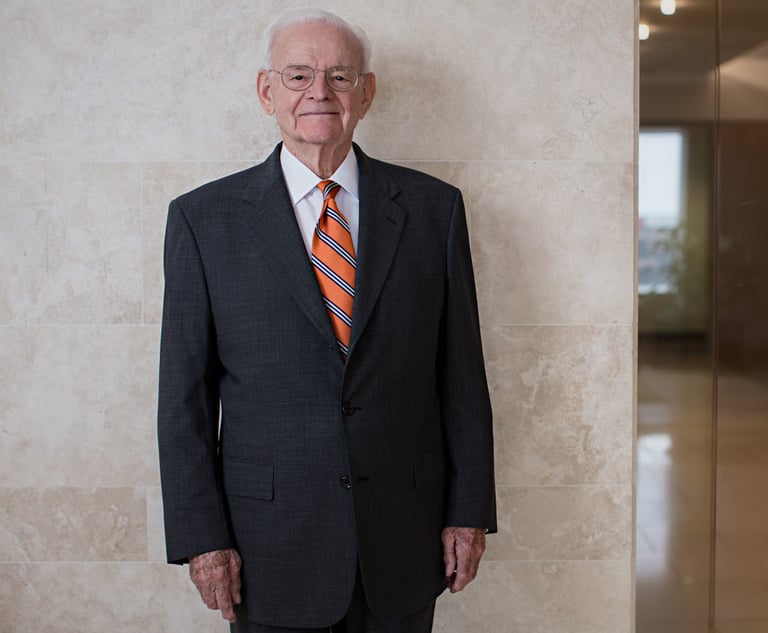Do the Privacy Interests of the Majority Outweigh Those in a Small Minority?
The U.S. Court of Appeals for the Third Circuit, the federal court that sits neatly below the U.S. Supreme Court, has ruled that the trial court was correct when it refused to prevent a school district from allowing transgender students to use bathrooms and locker rooms consistent with the students' gender choice as opposed to the sex they were determined to have been born with.
September 06, 2018 at 12:37 PM
6 minute read
 Cliff Rieders
Cliff Rieders
The U.S. Court of Appeals for the Third Circuit, the federal court that sits neatly below the U.S. Supreme Court, has ruled that the trial court was correct when it refused to prevent a school district from allowing transgender students to use bathrooms and locker rooms consistent with the students' gender choice as opposed to the sex they were determined to have been born with.
The plaintiffs were a group of high school students who believed that the school policy violated their constitutional rights. Whose constitutional rights are more important; students concerned about their privacy rights or those who identify as transgender?
Such clashes of controversy have not been unusual. The civil rights era generally was followed by many cases being filed where the plaintiffs claimed that they were victims of reverse discrimination. Should a white person be denied entry to a college because affirmative action has placed African-American students in the white man's seat? Generally speaking, the U.S. Supreme Court has frowned upon affecting one person's rights in order to advance the cause of another.
However, in the Doe v. Boyertown Area School District case, the court was convinced that the rights of the students who were not transgender might be personally offended by the school district's policy, but they would not suffer any particular harm. The court noted that approximately 1.4 million adults, or 0.6 percent of the adult population of the United States, identify as transgender. The fact that there is only a small number of transgender people is not the deciding criterion.
The court expressed a concern with respect to policies that exclude transgender individuals from private facilities that are consistent with their gender identities as having “detrimental affects on the physical and mental health, safety, and well-being of transgender individuals.” At slip opinion p. 6, citing “Amici Curiae American Academy of Pediatrics, American Medical Association.”
It was noted that in a survey of 27,000 transgender individuals, 40 percent reported a suicide attempt. That is a rate nine times higher than the general population. The court believed it important to protect the “rights” of transgender individuals. Underlying the result is the question as to precisely what are transgender rights and what is the legal vehicle by which they are recognized?
More to the point, the court refused an injunction because it believed that the nontransgender students would not prevail on the merits. The court found that even if the plaintiffs' constitutional rights to privacy were implicated the school district had a “compelling interest” in not discriminating against transgender students. Is it discrimination when a transgender student must use the bathroom related to the sex at the person's birth instead of the gender that person identifies with later in life? The court does not cogently answer this question.
In viewing “success on the merits,” one of the factors that must be reviewed in connection with the granting or refusal to grant an injunction, the court found that the nontransgender students had a fluid privacy interest. The court acquiesced in the principle, which it could not escape from, that the nontransgender students have a constitutionally protected privacy interest in their partially clothed body. One has independence in making important decisions, especially as they relate to one's own body. Nevertheless, the court determined that the “constitutional right to privacy is not absolute.” Be careful whenever a court says that a right is not “absolute,” because it means that the right will be swept away in the tides of current political or social discourse.
Judge Theodore McKee, writing for the court, noted that the constitutional right to privacy must be weighed against “important competing governmental interests.” One of those interests is the right of the government to protect transgender students.
In view of the fact that transgender students face extraordinary social, psychological and medical risks, the school district had a compelling interest in shielding those students “from discrimination.” What the court does not address is whether it is discriminatory to require a person to use a bathroom related to the sex of his/her birth. Where does the legal right arise from to identify with a sex other than one's birth, and therefore to use facilities involving personal intimacy that trample on the rights of others?
Courts do have an obligation to protect the interests of those most vulnerable in society. Understandably, transgender individuals face all kinds of serious obstacles to their life decision. The real question is whether the rights of those who choose a different sex than the one that exists at their birth are superior to the privacy rights of those who remain comfortable with their birth-given sex? That balancing hardly occurs. The court came down on the side of the school district concerned with those who have made choices exposing themselves to vulnerability as a result of their own decisions.
The court claims that it is not intending to minimize or ignore testimony suggesting that the students seeking the injunction avoid using restrooms and reduce their water intake in order to reduce the number of times they need to use restrooms under the new policy. “Nor do we discount the surprise the appellants reported feeling when in an intimate space with a student they understood was of the opposite biological sex.” The court claims sympathy with the “cisgender” students, but clearly the court is more sympathetic with the transgender students because of the challenges their life decisions have brought upon them.
Should this case go to the Supreme Court, the question is going to be whether being transgender is a constitutional right under our laws. A subsidiary question is going to be whether the privacy interests of the overwhelming majority of Americans must be set aside based upon the voluntary decision of a small minority.
We all know of situations where the sensibilities and sensitivities of the majority must give way to the civil rights of the minority. White people down South in the 1950s may not have liked it that black people wanted to eat in a diner open to the public. That is tough luck. There were specific civil rights laws passed in 1964 requiring places of accommodation to serve African-Americans. Do such laws exist now, to permit transgender students to use the bathrooms they wish? No, there is no such law and the court will have to grapple with the basis for any decision to set aside the privacy rights of the majority as a result of the choices of a minority.
The last chapter in the struggle has not yet been written.
Cliff Rieders, of Rieders, Travis, Humphrey, Waters, & Dorhmann, is a board-certified trial advocate in Williamsport, past president of the Pennsylvania Trial Lawyers Association and a past member of the Pennsylvania Patient Safety Authority. Contact him at [email protected].
This content has been archived. It is available through our partners, LexisNexis® and Bloomberg Law.
To view this content, please continue to their sites.
Not a Lexis Subscriber?
Subscribe Now
Not a Bloomberg Law Subscriber?
Subscribe Now
NOT FOR REPRINT
© 2025 ALM Global, LLC, All Rights Reserved. Request academic re-use from www.copyright.com. All other uses, submit a request to [email protected]. For more information visit Asset & Logo Licensing.
You Might Like
View All
Commonwealth Court Overturns Award of Damages Assessed Against Landlord on Claims of Unlawful Discrimination
6 minute read

Judge Louis C. Bechtle: An American Jurist Who Relied on Common Sense, Sound Judgment and Fairness
5 minute read
Six Ways Thought Leadership Can Support Your Law Firm’s 2025 Strategic Plan
6 minute readTrending Stories
- 1Meta Hires Litigation Strategy Chief, Tapping King & Spalding Partner Who Was Senior DOJ Official in First Trump Term
- 2Courts Beginning to Set Standards for Evidence Relying upon Artificial Intelligence
- 3First-Degree Murder Charge May Not Fit Mangione Case
- 4Legal Tech's Predictions for Legal Ops & In-House in 2025
- 5SDNY US Attorney Damian Williams Lands at Paul Weiss
Who Got The Work
Michael G. Bongiorno, Andrew Scott Dulberg and Elizabeth E. Driscoll from Wilmer Cutler Pickering Hale and Dorr have stepped in to represent Symbotic Inc., an A.I.-enabled technology platform that focuses on increasing supply chain efficiency, and other defendants in a pending shareholder derivative lawsuit. The case, filed Oct. 2 in Massachusetts District Court by the Brown Law Firm on behalf of Stephen Austen, accuses certain officers and directors of misleading investors in regard to Symbotic's potential for margin growth by failing to disclose that the company was not equipped to timely deploy its systems or manage expenses through project delays. The case, assigned to U.S. District Judge Nathaniel M. Gorton, is 1:24-cv-12522, Austen v. Cohen et al.
Who Got The Work
Edmund Polubinski and Marie Killmond of Davis Polk & Wardwell have entered appearances for data platform software development company MongoDB and other defendants in a pending shareholder derivative lawsuit. The action, filed Oct. 7 in New York Southern District Court by the Brown Law Firm, accuses the company's directors and/or officers of falsely expressing confidence in the company’s restructuring of its sales incentive plan and downplaying the severity of decreases in its upfront commitments. The case is 1:24-cv-07594, Roy v. Ittycheria et al.
Who Got The Work
Amy O. Bruchs and Kurt F. Ellison of Michael Best & Friedrich have entered appearances for Epic Systems Corp. in a pending employment discrimination lawsuit. The suit was filed Sept. 7 in Wisconsin Western District Court by Levine Eisberner LLC and Siri & Glimstad on behalf of a project manager who claims that he was wrongfully terminated after applying for a religious exemption to the defendant's COVID-19 vaccine mandate. The case, assigned to U.S. Magistrate Judge Anita Marie Boor, is 3:24-cv-00630, Secker, Nathan v. Epic Systems Corporation.
Who Got The Work
David X. Sullivan, Thomas J. Finn and Gregory A. Hall from McCarter & English have entered appearances for Sunrun Installation Services in a pending civil rights lawsuit. The complaint was filed Sept. 4 in Connecticut District Court by attorney Robert M. Berke on behalf of former employee George Edward Steins, who was arrested and charged with employing an unregistered home improvement salesperson. The complaint alleges that had Sunrun informed the Connecticut Department of Consumer Protection that the plaintiff's employment had ended in 2017 and that he no longer held Sunrun's home improvement contractor license, he would not have been hit with charges, which were dismissed in May 2024. The case, assigned to U.S. District Judge Jeffrey A. Meyer, is 3:24-cv-01423, Steins v. Sunrun, Inc. et al.
Who Got The Work
Greenberg Traurig shareholder Joshua L. Raskin has entered an appearance for boohoo.com UK Ltd. in a pending patent infringement lawsuit. The suit, filed Sept. 3 in Texas Eastern District Court by Rozier Hardt McDonough on behalf of Alto Dynamics, asserts five patents related to an online shopping platform. The case, assigned to U.S. District Judge Rodney Gilstrap, is 2:24-cv-00719, Alto Dynamics, LLC v. boohoo.com UK Limited.
Featured Firms
Law Offices of Gary Martin Hays & Associates, P.C.
(470) 294-1674
Law Offices of Mark E. Salomone
(857) 444-6468
Smith & Hassler
(713) 739-1250





